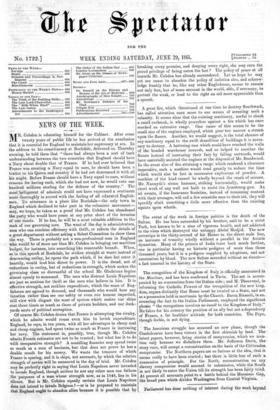NEWS OF THE WEEK.
W. Cobden is educating himself for the Cabinet. After some ./IL twenty years of public life he has arrived at the conclusion that it is essential for England to maintain her supremacy at sea. In the address to hisconstituency. at Rochdale, delivered on Thursday evening, he told them' hat " there had always been a sort of tacit understanding between the two countries that England should have 'alslavy about double that of France. If he had ever believed that 'France was creating a Navy equal to ours, he should have been a traitor to his Queen'and country if he had not denounced it with all . his might. Before France should have a Navy equal to ours, without reasons for.having such, which she had not now, he would vote one hundred millions sterling for the defence of the country." The rnoiebelligerent of admirals could not have expressed a sentiment . more' thoroughly in accord with the feeling of all educated English- men. its utterance in a place like Rochdale—the only town in ' England which declined to take part in the volunteer movement-- -may, welope, betaken as a proof .that Mr. Cobden has abandoned the party whorwould have peace at any price short of the invasion of our coasts. If he has, he will be a most valuable addition to the rank of our governing men. The want of the day is administrators, men who can combine efficiency with thrift, or reform the details of a great.department.without asking a Select Committee to show them the way. There is probably not a non-professional man in England who woiildbe of More use than Mr. Cobden in bringing our maritime budget,' for instance, into something like reasonable bounds. When, as"in 44-speech at Rochdale, he strikes straight at waste instead of _denouncing outlay, .he opens the path which, if he dare but enter it heartily,- would lead him direct to power. It is the dread, not of reductions in outlay, but of reductions in strength, which makes the .gOverning class so distrustful of the school Mr. Gladstone begins tilitost openly to command. The men who distrust Louis Napoleon are just as anxious for thrift as the men who believe in him. It is effective strength, not reckless expenditure, which the mass of Eng- lishmen are agreed to demand, and thousands who would bear any taxation rather than see our safety or even our honour imperiled, still view with disgust the want of system which makes our ships cost three times as much as those of private builders, and our dock- yards nests of political corruption.
Of course Mr. Cobden denies that France is attempting the rivalry, which he admits would rouse even him to lavish expenditure. England, he says, in ten years, with all her advantages in cheap coal and cheap engines, had spent twice as much as France in increasing her navy. The statement is, possibly, trim, though Mr. Cobden admits French estimates are not to be trusted; but what has it to do with comparative strength ? A muddling financier may spend twice as much as a man of business, but that does not prove he has a double result for his money. We waste the treasure of which France is sparing, and it is ships, not accounts, by which the relative strength of navies will be measured in the day of trial. Mr. Cobden may be perfectly right in saying that Louis Napoleon never intended to invade England, though neither he nor any other man can fathom the purposes of a man whose strength now, as in 1848, lies in his silence. But is Mr. Cobden equally certain that Louis Napoleon does not intend to invade Belgium?—or is he prepared to maintain that England ought to abandon allies because it is possible that by breaking every promise, and denying every right, she may earn the proud privilege of being eaten the last ? The policy of peace at all hazards Mr. Cobden has already surrendered. Let us hope he may yet see cause to abandon the policy of isolation also, and acknow- ledge frankly that he, like any other Englishman, means to remain not only free, but of some account in the world, able, if necessary, to protect the weak, or lend to the right an aid more appreciable than a speech.






























